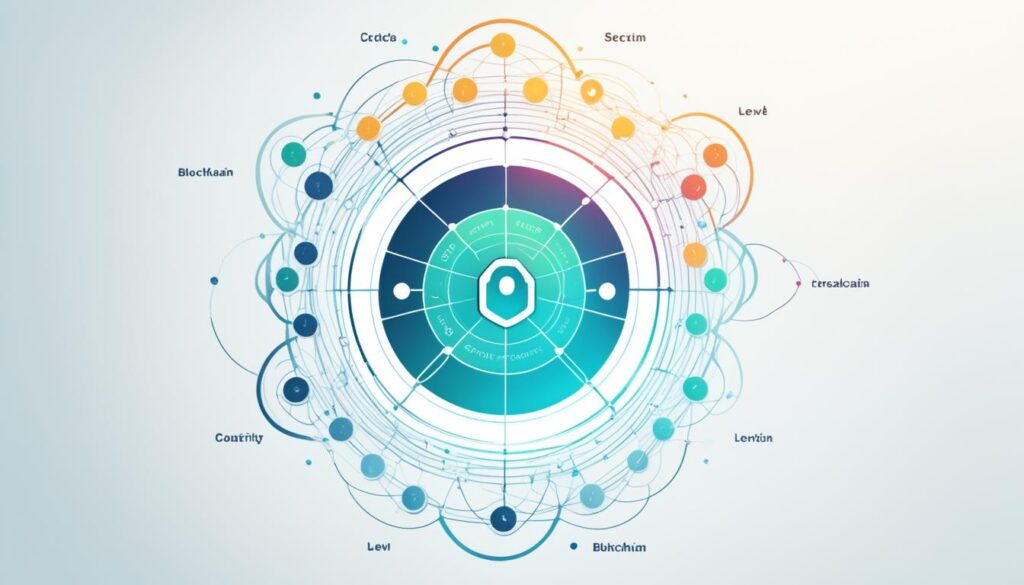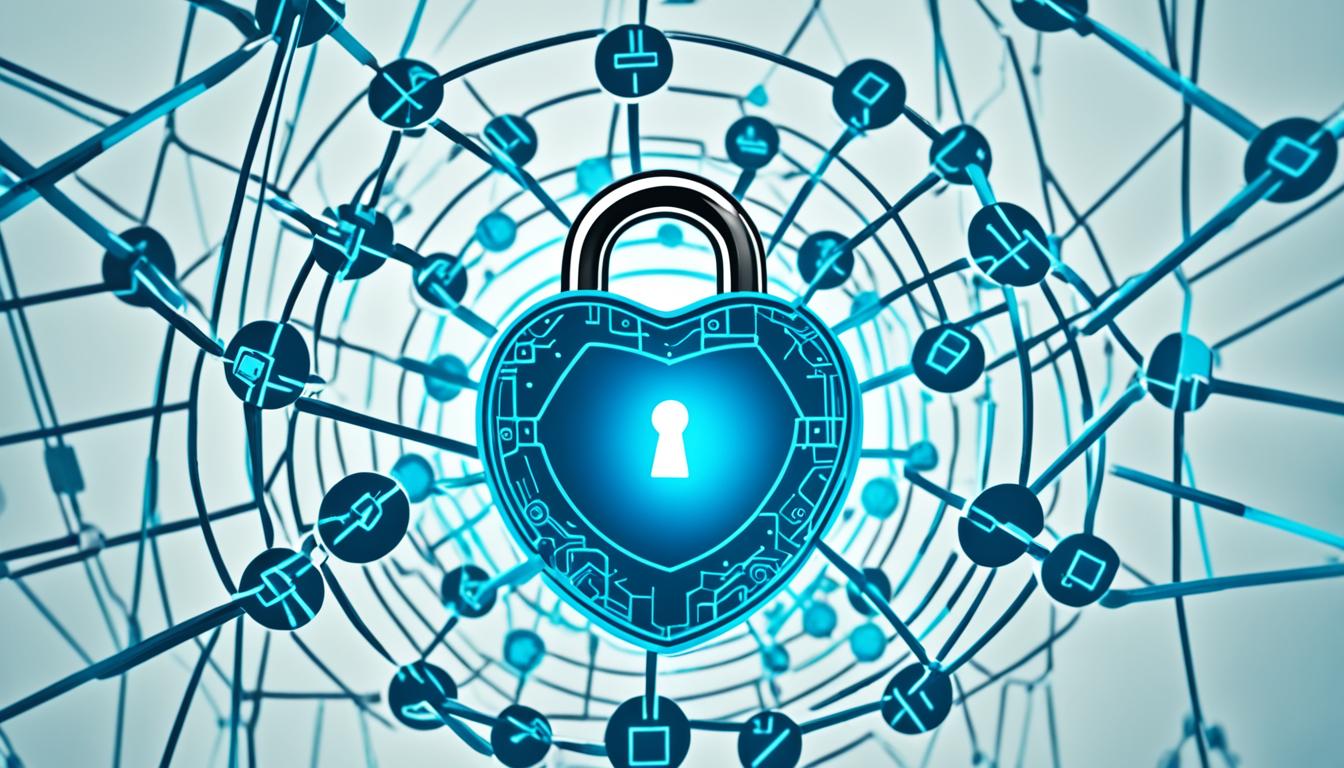In today’s rapidly evolving cybersecurity landscape, traditional security measures are no longer sufficient to combat the ever-increasing cyber threats. The importance of data security and privacy has become paramount, and organizations are seeking innovative solutions to protect their sensitive information. This is where blockchain technology comes into play.
Blockchain technology, most commonly associated with cryptocurrencies like Bitcoin, has extended its reach beyond finance and emerged as a revolutionary force in various industries. It offers a decentralized and secure platform for enhancing data security and privacy. Through cryptographic techniques and its transparent nature, blockchain ensures the confidentiality, integrity, and availability of data, making it a powerful tool in the fight against cybercrime.
Blockchain’s impact on cybersecurity cannot be understated. By leveraging the inherent characteristics of blockchain technology, organizations can fortify their online defenses and protect themselves from potential data breaches and cyber threats.
Key Takeaways:
- Blockchain technology offers a decentralized and transparent platform for enhancing data security and privacy.
- Through cryptographic techniques, blockchain ensures the confidentiality, integrity, and availability of data.
- By adopting blockchain solutions, organizations can protect themselves from potential data breaches and cyber threats.
- Blockchain’s impact on cybersecurity brings benefits such as transparency, efficient data sharing, and enhanced overall security.
- While blockchain has its challenges, staying updated with the latest developments can help organizations harness its potential and fortify their online defenses.
Understanding Cybersecurity Challenges in the Interconnected World
In today’s interconnected world, cybersecurity has become a critical concern for individuals, businesses, and governments. The frequency and sophistication of cyber attacks are increasing, exposing vulnerabilities in traditional security systems. Malicious actors exploit these vulnerabilities to gain unauthorized access to sensitive information, leading to significant financial and reputational damage. Traditional security measures, such as firewalls and encryption, are no longer sufficient to combat these threats. A new approach is needed to ensure the confidentiality, integrity, and availability of data.
“The number of data breaches reported in the United States has been steadily increasing over the years, highlighting the pressing need for robust cybersecurity measures.”
“Cybersecurity challenges arise from various sources, including technological advancements, evolving attack techniques, and human error. It is essential for individuals and organizations to understand these challenges in order to implement effective security measures.”
One of the primary challenges in cybersecurity is the constant evolution and complexity of cyber threats. Attackers are continually finding new ways to exploit vulnerabilities and bypass traditional security systems. This makes it challenging to anticipate and defend against emerging threats.
“The dynamic nature of cybersecurity necessitates the continuous monitoring and assessment of security systems and practices to identify and mitigate potential vulnerabilities.”
“The interconnected nature of modern networks and systems also introduces complexity in terms of security management, making it harder to ensure consistent protection across multiple devices and platforms.”
Data breaches pose another significant challenge in cybersecurity. The unauthorized access, acquisition, or disclosure of sensitive information can have severe consequences, including financial losses, legal liabilities, and damage to a company’s reputation.
“The Ponemon Institute estimates that the average cost of a data breach in the United States exceeded $8 million in 2020, underlining the financial impact of such incidents.”
Ensuring the confidentiality, integrity, and availability of data is essential for maintaining trust and safeguarding sensitive information in an interconnected world. Organizations must implement robust security measures that address these challenges effectively.
“Failure to protect data can result in significant financial losses, loss of customer trust, and legal consequences.”
“Implementing advanced security technologies, such as encryption, access controls, and threat detection systems, can help mitigate these risks and strengthen overall cybersecurity.”
Common Cybersecurity Challenges:
- Inadequate patch management
- Insider threats and social engineering attacks
- Advanced persistent threats (APTs)
- Weak authentication and access control
- Lack of employee cybersecurity awareness
- Legacy systems and outdated security protocols
- Third-party risks and supply chain vulnerabilities
- Emerging technologies and their potential vulnerabilities

Understanding the cybersecurity challenges in the interconnected world is the first step towards developing effective strategies and solutions to protect sensitive data and mitigate cyber risks. By addressing these challenges head-on and implementing robust security measures, individuals and organizations can enhance their cybersecurity posture and safeguard against increasingly complex and sophisticated cyber threats.
The Role of Blockchain in Addressing Cybersecurity Challenges
Blockchain technology plays a crucial role in addressing the cybersecurity challenges faced in today’s digital landscape. By leveraging its decentralized ledger, transparency, immutability, and cryptographic techniques, blockchain provides a secure and transparent platform for storing and transmitting sensitive information.
At its core, blockchain is a distributed ledger that records transactions across multiple computers, ensuring transparency and immutability. This decentralized nature of blockchain makes it extremely difficult for malicious actors to tamper with or manipulate the data stored on the blockchain. Each transaction is verified and added to the ledger through a consensus mechanism, creating a reliable and tamper-proof record of all activities.
By utilizing cryptographic techniques, blockchain ensures the privacy and security of information. Every transaction on the blockchain is cryptographically hashed, creating a unique digital fingerprint that verifies its integrity. This cryptographic hashing also ensures that the data remains secure and encrypted, protecting it from unauthorized access.
The transparency provided by blockchain allows for increased accountability and trust in cybersecurity processes. Every transaction on the blockchain is visible to all participants, creating a transparent and auditable system. This transparency enhances trust among participants, making it easier to detect and prevent fraudulent activities.
Furthermore, the decentralized nature of blockchain eliminates the need for a central authority, reducing the risk of a single point of failure. In traditional cybersecurity systems, a breach or compromise in a central authority can result in significant data breaches. However, with blockchain, the distributed nature of data storage ensures that even if one node is compromised, the information remains secure on other nodes.
Blockchain technology’s secure and transparent platform has practical applications in various cybersecurity domains. It can be used for secure identity management, where personal information is stored on the blockchain and accessed by authorized parties only. Additionally, blockchain enables secure file storage and sharing, eliminating the need for traditional file storage systems that are prone to data breaches.
By harnessing the power of blockchain, organizations can strengthen their cybersecurity defenses and mitigate the risks associated with data breaches and cyber attacks. The decentralized ledger, transparency, immutability, and cryptographic techniques provided by blockchain make it a valuable tool in addressing cybersecurity challenges and ensuring the security of sensitive information.

| Application | Description |
|---|---|
| Identity Management | Securely store and manage personal identities, enabling trusted and authenticated access to sensitive information. |
| Secure File Storage and Sharing | Eliminate the need for traditional file storage systems by leveraging blockchain’s decentralized and secure platform. |
| Supply Chain Security | Track and trace products across a supply chain, ensuring transparency and preventing counterfeit or tampered goods. |
| Smart Contracts | Automate and secure contract execution, eliminating the need for intermediaries and ensuring reliable and verifiable agreements. |
| Data Integrity and Verification | Verify the integrity of data stored on the blockchain, ensuring its authenticity and preventing unauthorized modifications. |
Benefits and Practical Applications of Blockchain in Cybersecurity
The adoption of blockchain technology in cybersecurity brings forth numerous benefits. Firstly, the decentralized nature of blockchain eliminates the reliance on a single authority, making it resistant to censorship and manipulation. This ensures that data stored on the blockchain remains secure and tamper-proof.
Secondly, blockchain provides a transparent and auditable platform, enabling organizations to track and verify transactions in real-time, helping in detecting and preventing fraudulent activities. The decentralized and transparent nature of blockchain enhances trust among stakeholders and promotes accountability.
Additionally, blockchain enables secure and efficient data sharing among multiple parties, reducing the need for intermediaries and enhancing the overall efficiency of cybersecurity processes. By eliminating the reliance on centralized servers, blockchain technology promotes a more efficient and streamlined data sharing ecosystem.
Practical applications of blockchain in cybersecurity are wide-ranging. One key application is identity management. Blockchain technology can provide a decentralized, tamper-proof record of digital identities, mitigating the risk of identity theft and fraud.
Another practical application is secure file storage and sharing. Blockchain-based decentralized storage platforms offer enhanced security and privacy for sensitive data, protecting it from unauthorized access or tampering.
Furthermore, blockchain can be utilized for secure supply chain management. By creating an immutable record of transactions at each stage of the supply chain, blockchain ensures transparency, traceability, and trust among all stakeholders.
Overall, the integration of blockchain technology in cybersecurity offers a wide array of benefits, including decentralized data storage, enhanced transparency, and efficient data sharing. These practical applications highlight the transformative potential of blockchain in safeguarding digital assets and fortifying the cybersecurity landscape.

| Benefits of Blockchain in Cybersecurity | Practical Applications |
|---|---|
| Decentralized nature | Identity management |
| Resistant to censorship and manipulation | Secure file storage and sharing |
| Transparency | Secure supply chain management |
| Auditable platform | |
| Secure and efficient data sharing |
Conclusion
Blockchain technology is revolutionizing the field of cybersecurity, providing innovative solutions to tackle the ever-growing challenges in this rapidly evolving landscape. With its decentralized and secure nature, blockchain offers a robust platform for storing and transmitting sensitive information. Through the use of cryptographic techniques, blockchain ensures the privacy and security of data, safeguarding individuals and organizations from potential cyber threats.
While there are obstacles and limitations to overcome, the future implications of blockchain in cybersecurity are highly promising. As the technology continues to evolve, we can expect to see an increased adoption of blockchain in various cybersecurity applications. The decentralized and transparent nature of blockchain provides a strong defense against data breaches and manipulation.
By embracing this revolutionary technology and implementing best practices, organizations can stay ahead in the battle against cybercrime. The potential for enhanced data security, transparency, and efficient data sharing through blockchain is substantial. As the industry adopts blockchain solutions for privacy and cybersecurity, we can look forward to a future where organizations can better protect their sensitive information and mitigate the risks associated with cyber threats.
FAQ
How does blockchain enhance data security and privacy?
Blockchain enhances data security and privacy through its decentralized and secure nature. By leveraging cryptographic techniques, blockchain ensures the privacy and security of sensitive information, protecting individuals and organizations from potential data breaches.
What role does blockchain play in cybersecurity?
Blockchain plays a crucial role in cybersecurity by providing a decentralized and transparent platform for storing and transmitting data. Its decentralized nature reduces the risk of a single point of failure and enhances the overall security of the system. Blockchain also offers transparency and immutability, making it difficult for malicious actors to tamper with or manipulate the data.
What are the benefits of using blockchain in cybersecurity?
The benefits of using blockchain in cybersecurity include enhanced data security, resistance to censorship and manipulation, transparency, and efficient data sharing among multiple parties. Blockchain provides a tamper-proof and auditable platform, allowing organizations to track and verify transactions in real-time, thus helping in detecting and preventing fraudulent activities.
What are some practical applications of blockchain in cybersecurity?
Some practical applications of blockchain in cybersecurity include identity management, secure file storage, and sharing. Blockchain technology enables secure and efficient data sharing among multiple parties, reducing the need for intermediaries and enhancing the overall efficiency of cybersecurity processes.
What is the future of blockchain in cybersecurity?
The future implications of blockchain in cybersecurity are promising. As the technology continues to evolve, increased adoption of blockchain in various cybersecurity applications can be expected. Embracing this revolutionary technology and implementing best practices can help organizations stay ahead in the battle against cybercrime.








